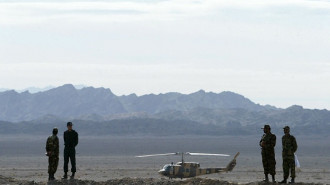IMF denies pressuring Tunisia to adopt austerity measures
The International Monetary Fund has claimed that it does not want austerity in Tunisia, and has in fact proposed programs to protect the poor from the impact of economic reforms, a Fund spokesman said Thursday.
Several hundred people have been arrested in Tunisia since social unrest erupted a week ago, fuelled by unemployment, corruption and austerity measures in the 2018 budget.
"The frustration the Tunisian people are feeling is understandable," said IMF spokesman Gerry Rice, speaking on the anniversary of the 2011 Tunisian uprising that launched the Arab Spring.
However, he defended the institution against what he described as an "outdated" view that it is the IMF causing the suffering.
"Speaking for the IMF, we do not want austerity. We do want well-designed, well-implemented, socially-balanced reforms," he said
He noted that the Fund has supported continuing subsidies for basic foodstuffs, raising taxes on non-essential items, and boosting funds for pensions and health care.
"At the end of the day it's their program, it's not something imposed by the IMF."
Economic reforms, which include reducing the size of the massive public sector and reforming the tax system, is the best way to achieve "growth and fairness," he said.
However, the program is seeking to address "very deep-seated, longstanding issues, so we can't expect to see success overnight," Rice cautioned.
The North African country is seen as having had a relatively smooth democratic transition since the January 14, 2011 toppling of President Zine El Abidine Ben Ali after 23 years in power.
But seven years later, anger has risen over new austerity measures after a year of rising prices, with protesters again chanting the 2011 slogans of "Work, Freedom, Dignity."
The IMF has supported the country through a four-year, $3 billion loan program. The fund's board is due to approve the third $320 million installment of the loan sometime in the fourth quarter, which would bring the total to $1 billion paid.
Although the IMF has denied demanding that Tunisia commit to austerity, in December it told the North African state that it needed to take "urgent action" and "decisive measures" to reduce its deficit.
Tunisia faced a series of shocks since 2007 and saw its growth rate plunge in 2011, but has recovered since 2014, with the economy expected to show a 2.3 percent expansion in 2017 and three percent this year.
Rice said that despite the frustration of the Tunisian people, "reversing those reforms would be the wrong option at this stage."

![Palestinians mourned the victims of an Israeli strike on Deir al-Balah [Getty]](/sites/default/files/styles/image_684x385/public/2024-11/GettyImages-2182362043.jpg?h=199d8c1f&itok=xSHZFbmc)


![The law could be enforced against teachers without prior notice [Getty]](/sites/default/files/styles/image_684x385/public/2178740715.jpeg?h=a5f2f23a&itok=hnqrCS4x)
 Follow the Middle East's top stories in English at The New Arab on Google News
Follow the Middle East's top stories in English at The New Arab on Google News
![Fakhrizadeh [AFP] Fakhrizadeh [AFP]](/sites/default/files/styles/image_330x185/public/media/images/774C39F7-8F7A-4D67-B998-27D102FCB4A7.png?h=d1cb525d&itok=j9eGvunV)

